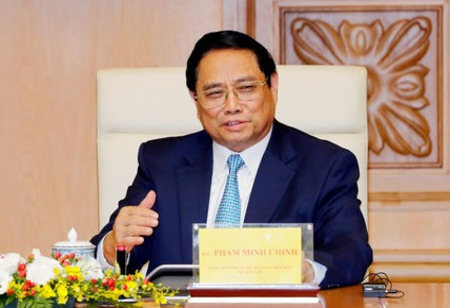
PM Urges Private Sector to Drive Economic Growth at ViPEL 2025


Speaking at the gathering, which took place before Viet Nam Entrepreneurs' Day on October 13 and commemorated the 80th anniversary of President Ho Chi Minh's correspondence to the business sector, PM Chinh emphasized the revolutionary effects of more than four decades of Doi Moi (reform).
He observed that agriculture transformed Viet Nam from an impoverished nation into a major global rice exporter, while manufacturing and foreign investment helped the nation surpass the lower middle-income level. He voiced confidence that science and technology, innovation, and digital advancement would drive Viet Nam toward achieving high-income nation status.
Also Read: S.Korea, China FMs to Develop Ties through APEC Summit
He urged private companies to take the lead in realizing Viet Nam's dual centennial objectives by synchronizing business strategies with national priorities, participating in patriotic initiatives through cutting-edge, technology-based products, and fostering equality, justice, social advancement and well-being to guarantee inclusive development.
Also Read: Investopia 2025: A Grand Plan to Revitalize the Global Investment Landscape
Companies were also encouraged to pursue comprehensive growth by leveraging domestic capabilities and overcoming constraints to emerge as a primary driver of expansion, employment generation, efficiency, competitiveness, industrial development, modernization, and economic transformation.
Furthermore, he promoted thorough, meaningful and successful international integration, allowing businesses to compete equally with multinational corporations, progress within global supply chains and embrace a forward-thinking, ambitious growth strategy.
During the event, several important initiatives were introduced, including the Viet Nam Low Altitude Economy Alliance (LAE), the Viet Nam Supporting Industries Manufacturers Alliance, and a 2025–2030 initiative to strengthen localization and supporting industry capabilities. An agreement was executed to implement an experimental public-private nation-building framework for 2025–2026, along with a strategy to recognize exceptional entrepreneurs and businesses.
Also Read: A Lot of Weightlifting Awaits Lip-Bu Tan, But is Intel Ready for Him?
Multiple collaborative agreements were signed during the event, featuring a strategic alliance between Ho Chi Minh City and the Viet Nam LAE Alliance, an agreement between Ho Chi Minh City and Sovico Group regarding Metro Line 4, and a partnership involving Hanoi, Sovico, and UNESCO to establish a "Creative Capital" framework based on cultural heritage and traditional principles. Additional agreements encompassed the "Made in Da Nang" initiative and a Thai Nguyen initiative centered on sustainable farming, heritage preservation, and cultural tourism connected to tea production.
The gathering attracted government representatives, international diplomatic personnel, and more than 500 delegates from global organizations, local and international business groups and companies.
ViPEL represents one of four responsibilities given by the Government to the Private Sector Development Research Board (Board IV) working alongside the Ministry of Finance, supporting the Politburo's Resolution 68 aimed at positioning the private sector as a fundamental economic force.
The event included specialized sessions, notably a Viet Nam Women Entrepreneurs' Forum highlighting women's role in private sector development. Discussion panels examined industry-specific obstacles, explored expansion possibilities, and suggested collaborative initiatives within the "Public-Private Nation-Building" concept.
The main session evaluated discussion results and presented major programs, including the "Public-Private Nation-Building" approach and the ViPEL system. These emphasize collaboration between public and private entities, connecting Viet Nam's supply chains, encouraging new technologies and innovation, strengthening competitive sectors, building essential infrastructure, and enhancing resources and services via the ViPEL platform.

